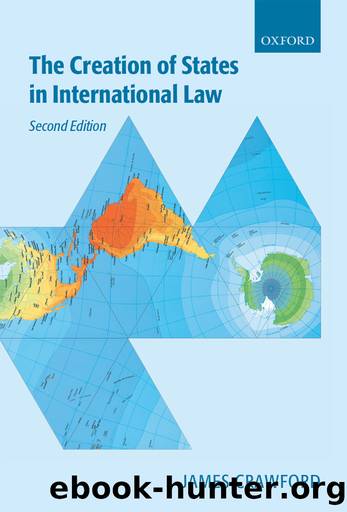The Creation of States in International Law by James R. Crawford;

Author:James R. Crawford;
Language: eng
Format: epub
Publisher: OUP Premium
(4)Remaining non-self-governing territories
As a result of the processes described above, there are now only sixteen remaining Chapter XI territoriesâleaving aside the possibility, already discussed, that other unlisted territories should be so considered.
Table 5. Remaining non-self-governing territories148
Each of the remaining non-self-governing territories belong to at least one multilateral organization, illustrating the greater willingness on the part of administering powers and third States to treat with these entities at least for some purposes as international legal persons. These territories also have entered into agreements or memoranda of understanding with neighbouring States.149
Table 6. Membership of non-self-governing territories in international organizations
Territory Organizations
American Samoa ESCAP (associate), Interpol (sub-bureau), IOC, PC
Anguilla Caricom (associate), CDB, Interpol (sub-bureau), OECS (associate), ECLAC (associate)
Bermuda Caricom (observer), CCC, ICFTU, Interpol (sub-bureau), IOC
British Virgin Islands Caricom (associate), CDB, ECLAC (associate), ICCAT, ILO (associate), Interpol (sub-bureau), IOC, OECS (associate), UNESCO (associate)
Cayman Islands Caricom (observer), CDB, Interpol (sub-bureau), IOC, UNESCO (associate)
Falkland Islands ICFTU
Gibraltar Interpol (sub-bureau)
Guam ESCAP (associate), Interpol (sub-bureau), IOC, PC
Montserrat Caricom, CDB, ECLAC (associate), ICFTU, Interpol (sub-bureau), OECS, WCL
New Caledonia ESCAP (associate), FZ, ICFTU, PC, WFTU, WMO, PIF (observer)
Pitcairn PC
St. Helena ICFTU
Tokelau PC, WHO (associate), UNESCO (associate)
Turks and Caicos Islands Caricom (associate), CDB, Interpol (sub-bureau)
United States Virgin Islands ECLAC (associate), Interpol (sub-bureau), IOC
Western Sahara African Union (as Saharawi Arab Democratic Republic) 150
In a number of these territories, popular consultations have taken place that have rejected some option of self-governing status (independence or integration), and have in effect opted for the colonial status quo. Some writers have referred, in consequence, to a âfourth option,â which apparently would add to the three options under Principle VI of resolution 1541 (XV), analysed above.151 In terms of the Friendly Relations Declaration, this âfourth optionâ involves âthe emergence into any other political status freely determined by a peopleâ.152 In a similar context the United Kingdom and the United Statesâbetween them responsible for fourteen of the sixteen remaining territoriesâhave asserted that the Committee of Twenty-four is wrongly insisting on âa single and narrow standard for decolonization.â153 According to this view, the standards hitherto applied under resolutions 1514(XV) and 1541(XV) are too narrow to accommodate the territories now in the process of decolonization.154 Representatives of some of the territories concerned have put forward what they saw as a fourth, sui generis option: ânegotiation with respect to an individualized arrangement mutually agreed by territory and administering powerâ.155
Clearly it is inappropriate to force small communities into a rigid set of choices that do not reflect or respond to their needs and wishes. But to assume that the existing law of decolonization does this is mistaken. There is a wide range of choiceâparticularly in the case of association, which can cover a spectrum of possibilities from virtual independence to virtual integration. The peoples concerned may be encouragedâand have a rightâto be free. But there are different forms of freedom.156
It may, however, be useful to speak of a âfourth optionâ in another sense. Plebiscites in a number of Chapter XI territories have shown that the inhabitants wish to retain their existing dependent status. This has been so in Bermuda,157 the Virgin Islands158 and American Samoa.
Download
This site does not store any files on its server. We only index and link to content provided by other sites. Please contact the content providers to delete copyright contents if any and email us, we'll remove relevant links or contents immediately.
| Anthropology | Archaeology |
| Philosophy | Politics & Government |
| Social Sciences | Sociology |
| Women's Studies |
Cecilia; Or, Memoirs of an Heiress — Volume 1 by Fanny Burney(32075)
Cecilia; Or, Memoirs of an Heiress — Volume 3 by Fanny Burney(31469)
Cecilia; Or, Memoirs of an Heiress — Volume 2 by Fanny Burney(31419)
The Great Music City by Andrea Baker(30797)
We're Going to Need More Wine by Gabrielle Union(18644)
All the Missing Girls by Megan Miranda(14791)
Pimp by Iceberg Slim(13801)
Bombshells: Glamour Girls of a Lifetime by Sullivan Steve(13700)
Fifty Shades Freed by E L James(12926)
Talking to Strangers by Malcolm Gladwell(12889)
Norse Mythology by Gaiman Neil(12862)
For the Love of Europe by Rick Steves(11559)
Crazy Rich Asians by Kevin Kwan(8898)
Mindhunter: Inside the FBI's Elite Serial Crime Unit by John E. Douglas & Mark Olshaker(8723)
The Lost Art of Listening by Michael P. Nichols(7170)
Enlightenment Now: The Case for Reason, Science, Humanism, and Progress by Steven Pinker(6879)
The Four Agreements by Don Miguel Ruiz(6326)
Bad Blood by John Carreyrou(6286)
Weapons of Math Destruction by Cathy O'Neil(5848)
